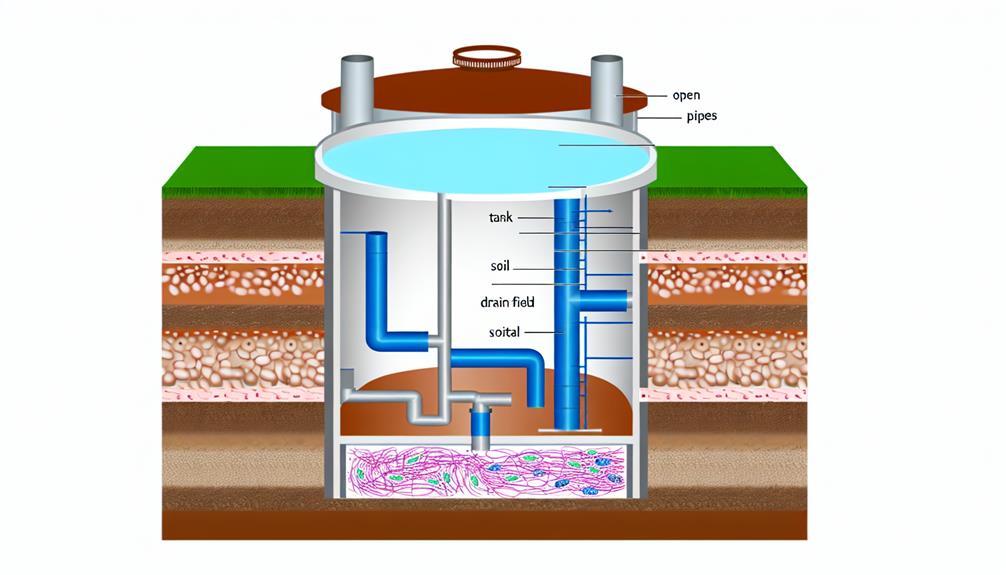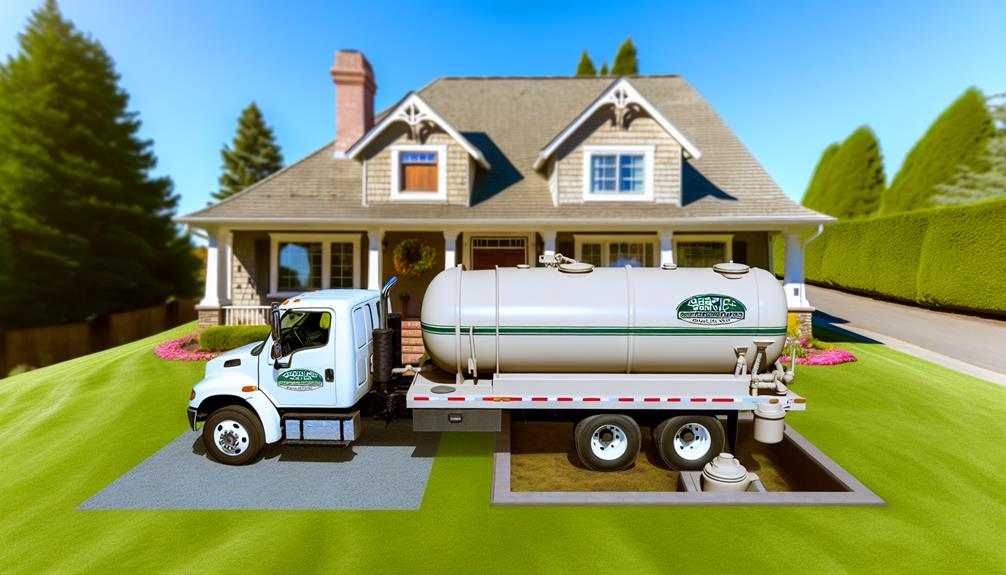Discover how to protect your septic system from breakdown with...
Read MoreYou & Your Septic Tank
Mastering Septic System Basics: A How-To Guide
Our professional septic service team offers comprehensive septic tank pumping services to keep your system running smoothly. Get a FREE Quote Today.

Mastering Septic System Basics: A How-To Guide
Imagine the intricate network of pipes buried in your backyard as a silent, unseen hero, working tirelessly to keep your home clean and healthy.
You’ve probably never given much thought to your septic system, but it’s time you did. Mastering the basics of septic systems isn’t just for plumbers or environmental engineers – it’s for you, the homeowner who values a well-functioning household and wants to avoid costly repairs.
By getting to know your septic system, you’ll not only gain peace of mind, but you’ll also be equipped with the knowledge to prevent potential disasters.
But where do you start? Stay tuned, as we’re about to demystify the world of septic systems.
Key Takeaways
- Understanding the components of a septic system, including the septic tank, distribution box, and drain field, is crucial for proper functionality and environmental impact.
- Regular maintenance, such as checking tank levels, pumping out the tank every 3-5 years, and keeping the drain field clear, is essential for the longevity of the septic system.
- Signs of septic system failure, such as slow drains, soggy areas, unpleasant odors, and contaminated well water, should not be ignored, as they indicate potential environmental impacts.
- Selecting the right septic pumping service involves considering factors like cost, emergency response capability, reputation, licenses and insurance, as well as the experience and expertise of the technicians.
Understanding Septic System Components

Before diving into the intricacies of managing a septic system, it’s critical to understand its key components and how they work in harmony to treat wastewater efficiently. The septic system design is a crucial factor determining the functionality and environmental impacts of the system.
Primarily, your system comprises a septic tank, distribution box, and drain field. Wastewater flows from your home to the septic tank, where solids settle, forming sludge while fats and oils rise, creating scum. The remaining liquid, or effluent, exits to the distribution box, which evenly distributes it into the drain field.
The drain field, often designed with perforated pipes laid in gravel-filled trenches, disperses the effluent into the soil. Here, natural processes take over. Soil-based microorganisms break down the wastewater, filtering and purifying it before it reaches groundwater.
The septic system design is critical in minimizing environmental impacts. Poorly designed or malfunctioning systems can contribute to groundwater contamination, negatively impacting local ecosystems. Proper understanding, regular maintenance, and timely repairs are your tools in ensuring your septic system isn’t only efficient but also environmentally friendly.
Proper Septic Tank Maintenance
Now that we’ve grasped the fundamentals of septic system components, let’s focus on the essential task of maintaining your septic tank properly to ensure its efficiency and long-term functionality.
Tank capacity considerations are crucial in septic tank maintenance. Your tank’s capacity should be adequate for your household’s wastewater output. If your tank is too small, it’ll fill up quickly and won’t have enough time to treat the waste, leading to potential system failures. Regularly check your tank’s level to avoid overfilling, and get it pumped out when needed.
Drainfield maintenance involves ensuring that the area around your drainfield is clear of trees or large shrubs whose roots can damage the drain lines. Also, avoid driving or parking vehicles on your drainfield to prevent soil compression, which can impede the wastewater treatment process.
Here is a brief table summarizing key maintenance tasks:
| Task | Description |
|---|---|
| Check tank level | Regularly monitor to avoid overfilling |
| Pump out tank | Do this when necessary, usually every 3-5 years |
| Protect drainfield | Keep clear of trees, shrubs and vehicles |
With consistent maintenance, you’ll extend the life of your septic system and avoid costly repairs.
Signs of Septic System Failure

Let’s dive into the telltale signs that your septic system might be failing, a crucial aspect for maintaining a healthy and functioning septic system.
Firstly, you’ll notice slow running drains and toilets that don’t flush properly. It’s more than just a minor inconvenience; it’s an early warning sign. If you’ve tried to clear the blockages with no success, your septic system may be the culprit.
Secondly, observe the area around your septic tank and drain field. Soggy areas, lush grass, or even pools of standing water aren’t good signs. These symptoms typically indicate that waste isn’t being effectively processed and is seeping up to the surface.
Thirdly, unpleasant odors around your home, particularly near the septic tank or drain field, can be a sign of a failing system. These odors can create health risks for your family and even your pets.
Lastly, if you notice contaminated well water, it’s a clear signal of system failure. It suggests that untreated waste is leaking into your groundwater, posing significant environmental impacts.
The Importance of Regular Pumping
Regular septic system pumping plays a pivotal role in its overall performance, longevity, and your home’s sanitary conditions. It’s not just a chore to be put off; it’s a necessity for a healthy, well-functioning home. The frequency of pumping varies depending on the size of your tank, the number of people in your household, and the amount of wastewater generated. Nevertheless, most experts recommend a pumping frequency of once every 3-5 years.
Ignoring this crucial task can lead to a slew of health implications. Overflowing septic systems can contaminate your home’s environment and surrounding areas with harmful bacteria, viruses, and parasites. These pathogens can infiltrate your water supply, posing serious health risks like gastrointestinal illnesses, Hepatitis, and other infections.
Additionally, neglecting regular pumping can cause solids to build up in the tank, leading to blockages and the eventual failure of your system.
Selecting the Right Septic Pumping Service

Choosing a reliable septic pumping service is a crucial decision that requires careful consideration of several factors. Firstly, service cost evaluation is vital. You’ve got to research and compare prices from different providers. Don’t get swayed by low prices; quality should be your primary concern. But also, don’t assume that high prices guarantee excellent service. Check for hidden costs and ensure the price covers all services you need.
Next, it’s essential to consider the company’s emergency response capability. Septic system emergencies can happen at any time and waiting could lead to significant damage. You’ll want a service that can respond promptly and effectively, even during odd hours.
The company’s reputation is also crucial. Look for customer reviews and ratings online, and ask around for recommendations. A company with a solid reputation is likely to provide reliable service.
Also, check if the company has the necessary licenses and insurance. These factors protect you in case something goes wrong during the service.
Lastly, consider the experience and expertise of the technicians. They should have extensive knowledge of different septic systems and the best practices for maintaining them.
Frequently Asked Questions
What Is the Average Lifespan of a Septic System?
You’re asking about the average lifespan of a septic system. With proper system maintenance, it can last 25-30 years. However, lifespan factors such as soil condition and usage can greatly influence its longevity.
Can a Septic Tank Service Be Performed by a Non-Professional?
Sure, you can perform DIY maintenance on your septic tank, but beware! Non-professional risks abound, including improper servicing and potential damage. It’s essential to understand the system thoroughly before taking on such a task.
What Are the Legal Requirements for Installing a Septic System?
You’ll need to acquire the necessary permits before installing a septic system. Inspection protocols must be strictly adhered to, ensuring compliance with local health and environmental regulations. It’s crucial to follow these legal requirements.
How Does a Septic System Impact the Environment?
Your septic system can greatly impact the environment. If it’s properly managed, it promotes septic system sustainability and offers environmental benefits like water filtration. However, if it’s not, it can contaminate local water sources.
What Are the Potential Health Risks Associated With a Faulty Septic System?
If your septic system’s faulty, you’re at risk for disease transmission. It can lead to contaminated groundwater, potentially causing illnesses like gastroenteritis, Hepatitis A, or even Typhoid. Regular maintenance’s essential to prevent such health hazards.
Conclusion
In mastering septic system basics, remember, your tank requires regular maintenance to prevent costly repairs. Regular pumping is a must, and choosing a competent service, like Septic Solutions, ensures a functional system. The Smiths neglected their system and faced a massive clean-up. So, don’t ignore the signs of failure. Stay on top of your septic system’s health and it will serve you well for years to come.
You may also like...
Why Are DIY Fixes Essential for Septic Tank Pumping?
Tap into the importance of DIY fixes for septic tank...
Read MoreUnveiling the Average Costs of Septic Tank Pumping
Master the mysteries of septic tank pumping costs and avoid...
Read More
The Best Septic Tank Pumping Services Near You

Answer Some Questions
Let us know about your needs so we can find you the right septic tank pros.

Get Quotes
We will put you in touch with the right septic tank pros for your job and location.

Hire Right
Compare quotes, message or call pros, and hire only when ready.



